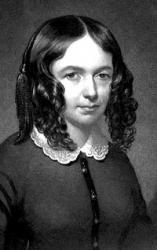Go Ad-Free
If you regularly use Hymnary.org, you might benefit from eliminating ads. Consider buying a Hymnary Pro subscription.

| Short Name: | Elizabeth Barrett Browning |
| Full Name: | Browning, Elizabeth Barrett, 1809-1861 |
| Birth Year: | 1809 |
| Death Year: | 1861 |
Browning, Elizabeth, née Barrett, daughter of Mr. Barrett, an English country gentleman, and wife of Robert Browning, the poet, was born in London 1809, and died at Florence in 1861. As a poetess she stands at the head of English female writers, and her secular works are well known. Sacred pieces from her works are in common use in America. They include:
1. God, named Love, whose fount Thou art. Love.
2. How high Thou art! Our songs can own. Divine Perfection.
3. Of all the thought of God, that are. Death.
4. What would we give to our beloved? Pt. ii. of No. 3.
5. When Jesus' friend had ceased to be. Friendship. Based on the death of Lazarus.
These hymns are in Beecher's Plymouth Collection 1855; Hedge and Huntington's Hymns for the Church of Christ, Boston, U.S., 1853, &c.
-- John Julian, Dictionary of Hymnology (1907)
=====================
Browning, Elizabeth, née Barrett, p. 187, i. We find that the usually accepted birth-place (London) of Mrs. Browning must be corrected. She was born at Coxhoe Hall, Durham, March 6, 1806, and baptised as Eliza¬beth Barrett Moulton Barrett at Kelloe Church, Durham, Feb. 10, 1808. [Rev. James Mearns. M.A.]
--John Julian, Dictionary of Hymnology, New Supplement (1907)
| Texts by Elizabeth Barrett Browning (17) | As | Authority Languages | Instances |
|---|---|---|---|
| All are not taken, there are left behind | Elizabeth Barrett Browning (Author) | English | 2 |
| By anguish which made pale the sun | Elizabeth Barrett Browning (Author) | English | 2 |
| Earth's crammed with heaven | Elizabeth Barrett Browning (Author) | English | 2 |
| From my lips in their defilement | E. B. Browning (Translator) | English | 2 |
| God lent him and takes him, you sigh | Elizabeth Barrett Browning (Author) | English | 2 |
| God, named Love, whose fount thou art | Elizabeth Barrett Browning (Author) | 7 | |
| How high thou art, our songs can own | Elizabeth Barrett Browning (Author) | English | 8 |
| Of all the thoughts of God that are | Elizabeth Barrett Browning (Author) | English | 24 |
| Poor earth, poor heart, too weak, too weak | Elizabeth Barrett Browning (Author) | English | 2 |
| Since without Thee we do no good | Elizabeth Barrett Browning (Author) | English | 8 |
| Speak to me, O my Savior, low and sweet | Elizabeth Barrett Browning (Author) | English | 2 |
| Take from my head the thorn wreath brown! | Elizabeth Barrett Browning (Author) | English | 2 |
| The little cares that fettered me | Elizabeth Barrett Browning (1806-61) (Author) | English | 2 |
| What are we set on earth for? Say, to toil | Mrs. E. B. Browning (Author) | 2 | |
| What would we give to our beloved | Mrs. Browning (Author) | 4 | |
| When Jesus' friend had ceased to be | Mrs. Browning (Author) | 4 | |
| When some beloved, neath whose eyelids lay | Elizabeth Barrett Browning (Author) | English | 2 |